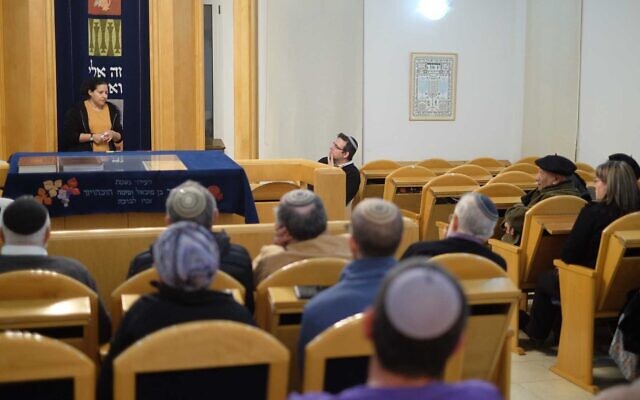Rabbi Yoni Rosensweig seems to take away stigma of psychological well being, one ruling at a time
At first, Rabbi Yoni Rosensweig was simply searching for some solutions to a couple questions he’d been requested about Jewish regulation and psychological well being. That rapidly become a e-book after which a middle, which he helps run and which has already skilled dozens of rabbis.
“This matter type of selected me. I fell into it and I noticed that there was what to do. And earlier than I knew it I noticed that there was a major response from the neighborhood. So I mentioned to myself, if that is so necessary to folks, possibly I needs to be doing this,” Rosensweig instructed The Instances of Israel on Sunday.
Although he’s primarily targeted on this nexus of psychological well being and Jewish regulation, Rosensweig wears many hats. Ordained by the Orthodox Yeshivat Birkat Moshe within the Maale Adumim settlement, he leads the neighborhood of Netzach Menashe in Beit Shemesh, teaches on the progressive Orthodox Midreshet Lindenbaum in Jerusalem, has written a number of books, and maintains a major following from his work as a posek, a rabbi who makes sensible rulings on Jewish regulation, or halacha. His ask-me-anything periods forward of Passover, as an illustration, are to not be missed. (Full disclosure: He additionally officiated this reporter’s marriage ceremony in 2019.)
Rosensweig’s journey into the sphere of psychological well being started roughly 5 years in the past when he acquired some questions from his neighborhood. Trying to higher perceive the subject, Rosensweig spoke to Dr. Shmuel Harris, a psychiatrist and the top of Machon Dvir, a behavioral well being clinic in Jerusalem.
“My purpose was to simply reply just a few questions. However as I acquired into it and realized that there’s much more work to do right here, we determined to write down a e-book on this matter,” Rosensweig mentioned.
The e-book that the 2 wrote collectively, “Nafshi B’She’elati,” was launched in Hebrew by Koren Publishers in 2022. An English translation is barely anticipated to be revealed later this 12 months, however his work has already made waves in English-speaking communities in Israel and world wide.
“There are numerous subjects in halacha that I may have chosen to look into. However this one impacts a whole lot or hundreds of individuals each single day. It’s really unbelievable to me {that a} e-book like this hasn’t been written earlier than. It’s one thing that’s so monumentally necessary to folks, that straight offers with their high quality of life and typically with their very lives,” he mentioned.
The 512-page “Nafshi B’She’elati” is geared towards rabbis and different professionals, with detailed explanations of technical terminology — each psychological and rabbinic — and footnotes which are typically longer than the principle textual content. However even for informal laypeople, it’s nonetheless a captivating learn, addressing subjects like schizophrenia, melancholy, consuming problems, phobias, autism and dementia.
With the discharge of the e-book, Rosensweig additionally based Ma’aglei Nefesh: The Middle for Psychological Well being, Group, and Halacha, which helps join folks with psychological well being points to therapists and rabbis, produces literature on psychological well being and halacha, and performs 50-hour coaching periods for rabbis on psychological well being subjects.
We all know learn how to speak about most cancers, not melancholy
Although he’s removed from the one rabbi to contemplate the connection between psychological well being and halacha, Rosensweig has emerged as a distinguished voice on the subject, talking about it a minimum of every week both inside non secular communities — in synagogues or seminaries — or to medical or psychological well being professionals, in hospitals, or to teams of social staff.
Rosensweig held such an occasion on Sunday night time, talking about his work within the Neve Habaron Synagogue within the northern city of Zichron Yaakov, the place he was joined onstage by a spiritual girl who shared her experiences coping with anxiousness, melancholy, and suicidal ideas.
The speak dealt each with the necessity for communities to broaden their fascinated with psychological well being and with what concerns go into his rulings on halacha.
Rosensweig mentioned his hope is that by occasions like this, communities will study the vocabulary needed for open discussions about psychological well being, as they have already got for bodily well being.

Or discusses her struggles with psychological well being on the Neve Habaron synagogue within the northern city of Zichron Yaakov on January 22, 2023. (Judah Ari Gross/Instances of Israel)
“Even in case you don’t have skilled, medical coaching, you can also make small speak about bodily well being. In case you discover out an individual — heaven forbid — has most cancers, somebody will say, ‘Have you ever seen an oncologist? Have you ever began chemotherapy?’ I don’t know what chemotherapy is, probably not, however I can nonetheless speak about it and sound delicate and knowledgeable in order that the particular person feels that they’ll speak to me about it. If I run into them on the road, I can ask how they’re doing, how they really feel,” Rosensweig mentioned.
“However when it’s melancholy, we don’t know what to say. That’s the issue. I do know that 5 years in the past, I didn’t know learn how to have that type of small speak about psychological well being. In case you discover out somebody has melancholy, you typically don’t know what comes subsequent. Do you see a psychologist? A psychiatrist? A social employee? How lengthy does it final? What’s the method? And in case you see that particular person, what do you ask, ‘How’s your melancholy?’ What’s the fitting and delicate factor to say?” he mentioned.
Halacha and psychological well being
For non secular Jews, halacha governs most points of their lives, corresponding to how and what they eat, how they work together with household, and the way they spend Shabbat. These non secular legal guidelines might be difficult and even harmful in some instances for folks with sure psychological well being points. Fasting on Yom Kippur can set off a probably grave relapse for an individual who has handled an consuming dysfunction, as an illustration.

A replica of Nafshi B’She’elati by Rabbi Yoni Rosensweig and Dr. Shmuel Harris. (Judah Ari Gross/Instances of Israel)
“Nafshi B’She’elati” and far of Rosensweig’s work focuses on delving deep into the supply materials to seek out which points of halacha are versatile, the place exceptions might be made, and that are unequivocal divine prohibitions that may’t be outdated. A few of that is primarily based on the character of the commandment — does it come straight from the Bible or was it developed later by rabbis — and a few relies on the impact that it will have on the particular person — is it life-saving or merely palliative?
Nevertheless, whereas a lot of “Nafshi B’She’elati” offers with issuing halachic leniencies for folks with numerous psychological well being situations, Rosensweig confused that rabbis shouldn’t be blindly permissive both with the intention to be certain that the particular person feels that they’re nonetheless abiding by Jewish regulation and are nonetheless a part of a spiritual neighborhood.
He famous that nobody is compelled to comply with Jewish regulation. The folks coming to him should not trying to get out of spiritual obligations; they need to comply with them.
“Folks need to quick on Yom Kippur. In case you inform them they’ll’t, they really feel rejected from the group, from the neighborhood. They need to be a part of this holy and superior day. When somebody’s instructed they’ll’t quick, it’s not excellent news for them — it’s tough information,” Rosensweig instructed the three dozen or so individuals who gathered within the Zichron Yaakov synagogue.
Rosensweig supplied an instance, a comparatively frequent one, of an individual with melancholy or anxiousness who’s helped by listening to music. What can an individual like that do on Shabbat, when using electrical energy is restricted?
In idea, Rosensweig mentioned, a rabbi may merely allow such an individual to make use of their telephone or pc to hearken to music on Shabbat. Nevertheless, doing so wouldn’t essentially make the particular person really feel that they’re preserving the legal guidelines of Shabbat.
“We’re attempting to battle stigma. We wish folks coping with psychological well being points to really feel seen and understood, to not really feel that they’re separate from the group, that they’re rejected, that they’re second-class. Each exception made for an individual for psychological well being causes feels to them like a failure, like they aren’t actually preserving Shabbat, that they aren’t sturdy like everybody else,” he mentioned.
As a substitute, he recommends having the particular person placed on a playlist on a loop earlier than Shabbat in order that if they should hearken to music, they want solely put of their headphones with out really turning something on.
“That you must strike a steadiness in the way you rule on halacha,” he mentioned.
Source link
